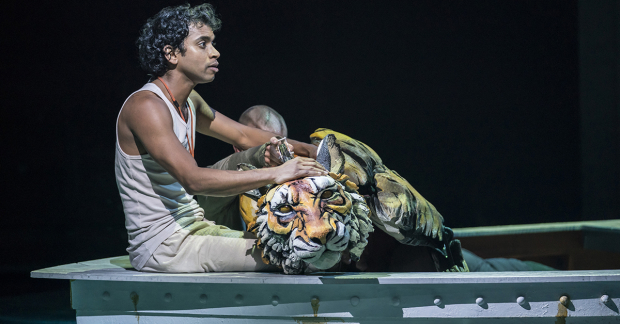Review: Life of Pi (Sheffield Crucible)
The stage adaptation of the Booker Prize-winning novel opens in Sheffield

© Johan Persson
A production that astonishes and delights by its colour, visual effects and puppetry begins quietly and drably. In front of a wall of doors and shuttered windows is a bed and not much else. The bed is empty. Everything is grey; it is clearly a hospital. A caption tells us this is Mexico. After a brief bustling appearance by a nurse, two foreigners take over: Lulu Chen from the Canadian Embassy and Mr Okamoto from the Japanese Board of Transport. The young man they are hoping to question, Piscine Molitor Patel, known as Pi, is hiding under the bed. When lured out, he combines post-traumatic stress with a playful wit, wrongfooting the earnestly business-like Okamoto again and again.
Then, as Pi starts his story, it all opens up in a riot of colour and music: Pondicherry Zoo two years previously. A giraffe looks out amiably from behind what was the wall, assorted animals flutter and glide and growl and play, and the family of the zoo owner is an affectionate unit. Despite his purchase of a Bengal tiger to boost attendances, the owner, Pi's father, is uncertain of the future, troubled by the weakness of the government, and feels that his children have led too sheltered a life. Hence he forces them to watch as the Bengal tiger, Richard Parker (there's a story behind that name), demonstrates that nature is red in tooth and claw – for by no means the last time in this production.
So, throughout the evening, with compelling fluency, we move between the hospital room (the well-meaning Chen and Okamoto increasingly unable to understand Pi's spirituality or sense of the possible) and more dramatic locations, the wall opening up on an Indian market or the bed becoming part of a lifeboat as the sides rise up and the ocean washes around it.
The story of Yann Martel's Man Booker-winning novel is well known, but is much more complex than the trademark image of Pi sharing a lifeboat with a tiger after a shipwreck. In practical terms Pi's father is taking his animals to Canada in a Japanese ship which sinks – hence the nationalities of the frustrated interrogators. In philosophical terms we are asked to think about questions of faith and possibility. When Mr Okamoto finds Pi's story incredible, Pi offers an alternative and asks Okamoto and Chen which they prefer. The answer is the one with the animals – Pi agrees because that one has God in it.
Everything about Max Webster's production of Lolita Chakrabarti's shrewd and sensitive adaptation works perfectly and much of it astonishes. Finn Caldwell's puppetry (with Nick Barnes also involved in the designs) uses visible puppeteers working magnificent-looking animals to great effect, so convincing that now and again you hold your breath at the leap of a tiger or the evisceration of a hapless animal victim. Tim Hatley's designs include as believable a shipwreck as you'll see on a stage as open as the Crucible, with row A checking their feet were still dry.
In such a spectacular on-stage experience there is a danger that the actors can be neglected, but Hiran Abeysekera is outstanding as Pi, from the innocent brightness of youth to the passions and existential fears of the journey to a sort of spiritual assurance. Though many of the star performers remain hidden behind wonderful puppet designs, David KS Tse (Okamoto) and Gabby Wong (Lulu Chen) are excellent as the representatives of the practical real world – and Kammy Darweish's old school father leads a team of Pi's relations (Mina Anwar, Tara Divina, Raj Ghatak and Syreeta Kumar) who charmingly and convincingly create a lost world that recurs in Pi's mid-ocean hallucinations.


















